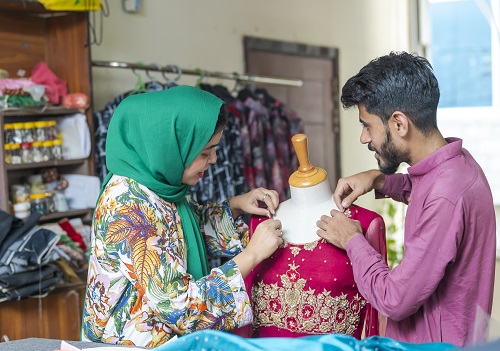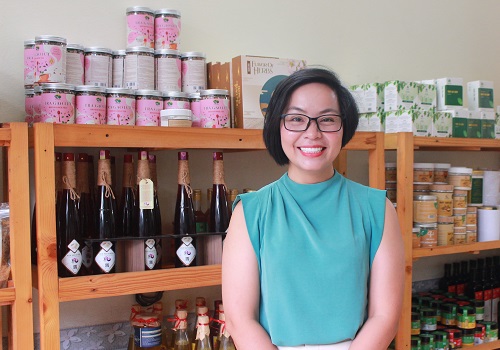Women entrepreneurs should be able to thrive. Yet they are bound by outdated expectations. The views that a woman should be the primary childcare giver and the man should be the breadwinner are so ingrained they remain consistently unchallenged. New research from CARE’s Ignite program confirms that women entrepreneurs worldwide are so bound by these norms, it is stunting their business success – meaning less income for the household and less employment for the community. This has to stop.
Understanding entrenched gender norms
Having worked in financial inclusion for 15 years, I have seen many fantastic initiatives focused on helping women gain better access to finance so that they can grow their businesses. But very few initiatives try to understand or address the deeply entrenched gender norms that are holding women entrepreneurs back.
Our research shows:
- In Vietnam, 80 percent of men and 60 percent of women agreed that businesswomen should be the main childcare giver, despite the pressure of running a business.
- In Peru, 80 percent of women interviewed say they are bound by traditional gender roles and the expectations and pressures from the family and society as caregivers.
- In Pakistan, 76 percent of respondents felt that family members will disapprove if a woman entrepreneur’s earnings surpass her husband’s.
One of the most alarming findings was that when women entrepreneurs start to succeed, they can face sabotage by their male family members, sometimes even violence or sexual harassment. In Pakistan, women told us that if they start earning more than their male family members, they are overburdened with household responsibilities to the point that they are forced to cut down on, or even discontinue, their business. Furthermore, women entrepreneurs who leave the house for business without a male family member are considered less moral and may be subject to harassment or sexual requests in return for work-related agreements.
In Peru, 100 percent of the women entrepreneurs interviewed had either seen or heard about a case of violence in their close environment. And broader research shows that 70 percent of women owners of formal small businesses have experienced violence by their partner including physical and economic violence. It is estimated that due to gender-based violence, women micro-entrepreneurs lose around $ 9,000 USD each year, causing a loss of 5.72 percent of GDP in Peru.
Revealingly, it is not just men who are piling expectations on women – it is also women themselves and their female family members. In Vietnam, mothers-in-law were revealed as the staunch enforcers of the norm related to childcare, the ones who would most disapprove if the man does more childcare than the woman. In Pakistan, it is predominantly the husband’s mother and his sisters who load pressure onto women to be at home taking care of the children and the household, and for the man to be the main breadwinner.
Now is the time to shift norms
It is clear that little is being done to shift these norms and the time to act is now. Time poverty is one of the biggest challenges facing women, a condition deeply intertwined with childcare and household duties. Admittedly, shifting gender norms is not an easy task, as it requires longer-term commitment and won’t necessarily provide a short-term return. But that shouldn’t stop us. At CARE we know that engaging directly with families can be transformational, increasing both the time women can spend on their business and their decision-making power.
I recently met with Nguyen Thi Thu in Vietnam who runs an organic farming network, as well as her own food business. She told me that she was really struggling with a lack of support from her husband which was affecting her marriage and her business. Following an event that we ran for women entrepreneurs and their families that promoted shared responsibility at home, she told me she had seen a transformation. “On that day, for the first time, he acknowledged my work and my contribution to society and the community. Since then he is really helping out with the children and the household chores. Now I can travel much more for work,” she said.
Through a combination of far-reaching social media campaigns and in-person workshops, CARE is beginning to see small changes. Media campaigns in all three countries, with male and female role models, have showcased shared responsibility in the home and are normalizing the growth and success of women entrepreneurs, with the campaigns generating a widespread appreciation for female entrepreneurs.
We know that by giving women increased opportunities and time, it allows them to focus on growing their own businesses so that they can further contribute to their local economies. We also know that women employ women and invest their incomes in their families and their communities. The benefits are indisputable.
Next steps are clear
My message to NGOs and financial institutions working in financial inclusion is clear:
- Design holistic programming for women entrepreneurs that includes addressing restrictive gender norms.
- Design programs that promote the benefits of shared responsibility in the household and the economic contributions of women entrepreneurs.
- Collect data related to perceptions and expectations around gendered roles and how these present barriers for the growth of women-led enterprises.
- Advocate for policies that respond to the specific challenges that women entrepreneurs face.
- Investing in women will always provide a return.
How CARE is responding
Having conducted this research, we are also making changes to our programming. We are developing new training, not just for women and their families, but also for our financial partners. We will also continue our campaigns and outreach activities which promote and normalize shared responsibility and women’s financial and digital independence.
By studying the barriers that are holding women entrepreneurs back, and then working closely with local partners to break down those barriers, CARE is building new opportunities for women entrepreneurs wanting to grow their businesses.
Despite the Ignite program launching in the midst of the pandemic, the program has unlocked 115 million USD in loan capital for women entrepreneurs, a twenty-two-fold uplift of the original program funding provided by the Mastercard Center for Inclusive Growth. 83 percent of Ignite participants tell us that the program has contributed to an increase in their business sales, helping to build their financial resilience.
By working together with women and their support networks we want everyone to recognize the importance of shared responsibility at home, and to value the enormous contribution women entrepreneurs are making to their families, communities and economies.
To learn more about what we’re doing to break down barriers for women, watch this video
Rathi Mani-Kandt has over 15 years experience designing products and services for low-income populations and has lived for 10 years in emerging and developing economies. She has expertise in designing inclusive financial products and services and is Director of Women’s Entrepreneurship & Financial Inclusion at CARE USA, this includes leading the Ignite Program. Previously, she led teams at a human-centered design firm in Cambodia and a fintech in South Africa.



